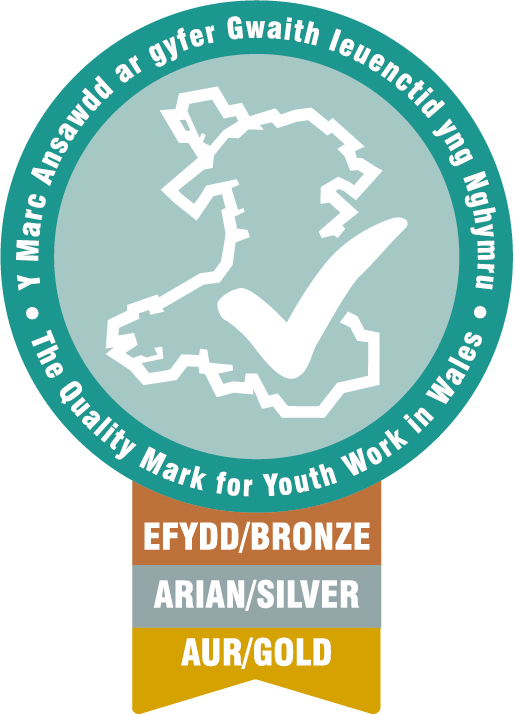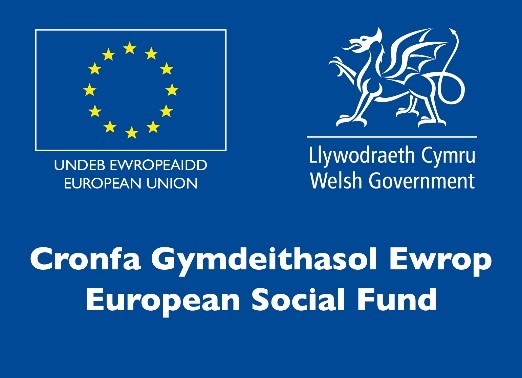 Organisation: Vale of Glamorgan Youth Service
Organisation: Vale of Glamorgan Youth Service
Project: Inspire to Work (I2W)
Contact: Peter Williams
The Vale of Glamorgan Inspire to Work (I2W) project has been supporting young people, aged 16 to 24, since April 2017. The project is part funded by the European Social Fund and is made up of three delivery members of staff.
The aim of the project is to support young people who are currently not in education, employment or training, into education, employment or training. This is done through various methods, including one to one sessions, group sessions, training courses, work experience, etc.
Many of the young people that the team support have significant barriers to engagement, some of which include poor experiences of education, poor support structures within their life, involvement with the justice system, substance use, lack of stable home life and poor mental health.
I2W take referrals from professionals, both internal and external of the Council. These referrals provide an element of insight into the needs of the young person, but it is not until the Learning Coach meets and begins to develop a rapport with the young person that the understanding of their needs become clearer. Each member of staff is a qualified youth worker and they utilise this skill-base to build a meaningful relationship with the individual. The skills of the team have grown as a result of our learning more about the needs of young people we serve. Some of the team have attended additional training in counselling skills in order to provide another skill-base to support the young people. The project is based on voluntary engagement and does not force an individual to engage, meaning that any support provided is done at the pace the young person sets.
Each young person has an action plan developed, which is then monitored and reviewed as the support goes on. Even though some elements will crossover with other young people, each plan is set with the young person’s individual needs at the forefront. As part of this, barriers to engagement or things that may negatively impact their wellbeing are identified, with plans put in place to help address these.
The support each young person receives can vary massively, however this is adjusted based on the needs of the individual. This can include additional support with essential skills, ECDL and ESOL courses dependent on the young person’s learning deficits. It has been found that in situations where there is either poor, or non-existent, family support, or where there has been bereavement of any immediate support structure that the staff team have to build in an element of nurture to their engagement as this has been potentially missing from their lives for many years. In relation to wellbeing, addressing this basic need is fundamental as without this, it will make sustaining any progression to education, employment or training unrealistic. Each young person has a different starting point in their journey, meaning that some young people may not be ready to engage in support of varying levels immediately; it can sometimes take weeks or months of one to one contact before a young person is ready to engage in a training course or group session.
As a rapport is built with the young person, it may become evident that the individual has some wider barriers that could be impacting their wellbeing. Examples of this include financial issues, housing situation, substance use and mental health issues. The I2W project acknowledge that they are not always best suited to support in these more specialist areas but have a good knowledge of partners and other agencies who the young person can be signposted to for support. The team use an holistic and young person- centred approach which has the young person’s choice and voice as a key aspect in their journey in the project. The team regularly support young people to attend meetings with new agencies or when starting work experience placements, so as to have a familiar face in order to alleviate any anxiety around meeting new professionals. Depending on the additional support required and being offered, it may be appropriate for the I2W staff to withdraw support at that time however, in the majority of cases, the team continue to support in partnership with other agencies to ensure the best package and consistency is in place for the individual.
Part of the provision on offer is to attend training courses, which help to increase knowledge in areas of work they are interested in exploring, gaining work relevant qualifications and certification as well as building their confidence in both a group scenario and also with their own ability. This is particularly relevant to those who are long-term unemployed as they may not have been able to do this since leaving compulsory education. Within the training courses, the project supports the transport of young people to be able to attend and provides lunch and refreshments for all in attendance. By doing this, young people who cannot afford to pay for their own lunch are not singled out within the group, resulting in a much more positive environment and again, removing any anxieties these young people may feel. It also means that the young people have sufficient energy levels to actively take part in the learning on offer. The same principle is applied to supporting young people to attend work experience, college courses and employment. The project can assist with covering certain costs for these situations, where young people are financially unable to support themselves. The approach outlined is intended to empower the young people to become more resilient, independent and confident and able to cope with future challenges in their lives.
Young people’s lives can be highly erratic, with changes happening with little to no notice. This can be from them presenting as being homeless, becoming involved with the criminal justice system, physical health issues as well as financial concerns. With the support of the project, the team are able to flexibly adapt and support young people as these changes occur, adjusting priorities to focus on those that are most relevant to the young people at that time. Where needed, the team also seek support and additional funding from other sources, including local charities and teams within the Council, to help cover the cost of certain items. Examples that the project has purchased for young people include: bikes for young people to access employment and training opportunities; white good products to support young people moving to non-equipped buildings or when their own items break and; laptops to be able to access online courses and training, particularly since the Covid-19 pandemic, which in turn supports the young people to become less isolated.
Through the Covid-19 pandemic, support has continued to be given to the young people and this has been done through email, phone calls, online sessions through Microsoft Teams and also doorstep visits being undertaken for those who are especially vulnerable. During parts of the pandemic, food parcels and hygiene packs were delivered to support some of these young people who were particularly struggling, as well as meeting young people who were particularly isolated within their local communities.
https://www.valeofglamorgan.gov.uk/en/living/youth_service/Youth-Service.aspx for full contact information.




